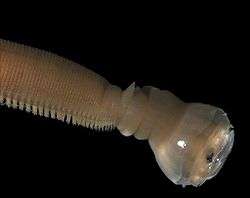Glyceridae
| Glyceridae | |
|---|---|
 | |
| Glycera alba with everted proboscis. | |
| Scientific classification | |
| Kingdom: | Animalia |
| Subkingdom: | Eumetazoa |
| Phylum: | Annelida |
| Class: | Polychaeta |
| Subclass: | Palpata |
| Order: | Phyllodocida |
| Suborder: | Glyceriformia |
| Family: | Glyceridae Grube, 1850 |
| Genera | |
|
Glycera | |
Glyceridae is a family of polychaete worms.[1] They are commonly referred to as beak-thrower worms or bloodworms. They are bright red, segmented, aquatic worms. The proboscis worm Glycera is sometimes called bloodworm. The Glyceridae are ferocious epi- and infaunal polychaetes that prey upon small invertebrates. They are errant burrowers that build galleries of interconnected tubes to aid in catching their prey.
Characteristics
- Pointy snout used for burrowing in sediment
- No septa in anterior part of bodies
- Rely on peristalsis to move
- Explosively evert pharynx into sediment, anchor position with prostomium and pull body forward.
- Eversible pharynx also used in prey capture: 4 poisonous fangs
References
This article is issued from Wikipedia - version of the 3/13/2015. The text is available under the Creative Commons Attribution/Share Alike but additional terms may apply for the media files.